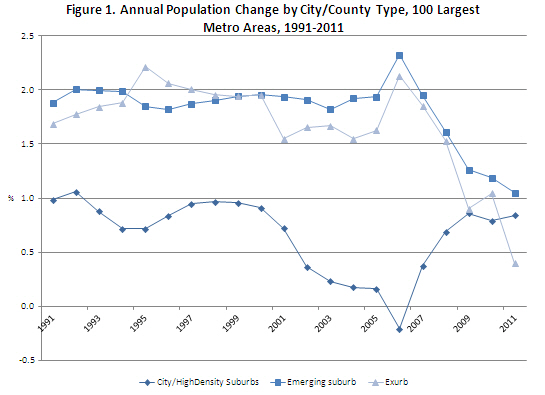In search of the American dream, floods of families sprawled to the exurbs to build homes and lives, far from the bustle of major cities. According to the Brookings Institution, within the last decade, exurbs were the fastest growing communities in the United States.
Exurbs are the far communities outside of the city and beyond the suburbs. Exurbs are commuter towns for suburban and urban areas with an average travel time to work of 45-60 minutes. The growth of such communities reached its peak around 2007; the time of the housing market bubble. Around 11 million people reside in these isolated and very affluent areas, comprising of approximately 6% of metropolitan areas. However, due to the economic recession, crash of the housing market, and inflated gas prices, exurbs have become a less attractive destination in comparison to the inner cities and their surrounding established suburbs. Figure 1, created by William Frey, a Demographer and Senior Fellow at the Brookings Institute, exemplifies the drastic shifts in population change in the metropolitan areas. Last year, was the first time in nearly 100 years that major cities in the United States experienced faster growth than their surrounding suburbs.
The Chicago region has witnessed fluctuating population trends. A report in the Washington Post details that Kendall County, IL, a neighboring county geographically distant from the Chicago metropolitan center, went from the United States fastest growing county in the 2000’s only to fall to 236th on the list in 2011. Additionally, in cities such as Cleveland and Detroit which were suffering a large population loss in the early 2000’s witnessed in 2011 a drastically slower population loss. As residents migrate back to communities within inner ring suburbs, strategic planning is necessary for the population shifts expected to take place in the region. Communities are not alone in the strategic planning process. Contact your local fair housing agency or the Oak Park Regional Housing Center for thought partnership through this process. Instituting fair housing policies is crucial for addressing demographic changes and shaping a municipality into the vision that residents and local officials desire for the community.
By Abigail Moore, Fair Housing Policy Research Assistant

